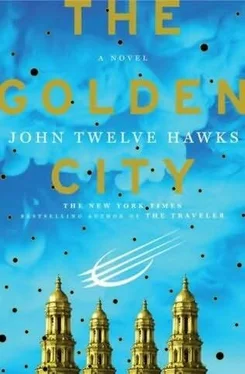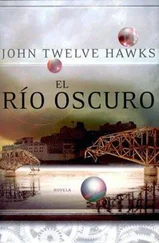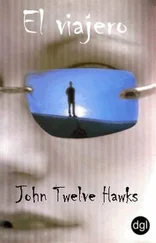Ten minutes later, he was sitting in the back of a limousine being driven to the airport. Cherry trees were flowering in the suburban countryside and their pink blossoms trembled as the car raced down the two-lane road.
Remember the story . Well, he could do that. The news articles he was getting from California showed that everyone was frightened. Parents were keeping their children home from school, and the police kept arresting the wrong suspects. With one decisive move, he had created a crisis that motivated people to enter an invisible prison. Once everyone was inside, a Traveler would watch them and guide their lives.
Michael saw his face reflected in the tinted glass and turned away. Who was he these days? The question kept drifting through his thoughts. The only way he could define himself was by thinking of others. He wasn’t his father-and he certainly wasn’t Gabriel. Both of them worried about small things, what a particular person did or said. But most individuals weren’t important in the grand narrative of history. For gods and great men, the world was a blank page to be filled with their own vision.
The limousine entered the airport through a side gate and stopped at a building where charter pilots filed their flight plans. A six-passenger jet was waiting on a side runway while the maintenance crew inspected its landing gear.
“Tell the pilot to get everything ready,” Michael said. “I need about five minutes to finish some business.”
“Very good, Mr. Corrigan.” The driver took Michael’s luggage from the trunk and carried it over to the plane.
Michael switched on his notebook computer and used a sat phone to reach the Internet. Ten days ago, he had told his staff in Britain to register all of the Evergreen Foundation vehicles with a British company called Safe Ride. Now Mrs. Brewster’s Jaguar sedan was connected to the company’s computers. The Safe Ride staff could give travel directions to Mrs. Brewster, unlock the car doors if she misplaced her keys and track her vehicle if it was stolen.
It took only a few seconds to find the Safe Ride website and enter a code that allowed him to access the tracking system. Typing in the Jaguar’s registration number brought up a satellite photograph of the Cornwall coast. And suddenly, there it was: Mrs. Brewster and her driver were a little red dot traveling on the B3301 rural highway.
Typing quickly, Michael put the local British time in one corner of the screen-it was 7:38 in the evening. Mrs. Brewster was rushing to the Portreath airport to meet the head of Argentina ’s top anti-terrorism unit. The Young World Leaders program connected her to police and military staff in dozens of countries. When these powerful men flew into the local airport, Mrs. Brewster was waiting for them, all charm and smiles.
Michael pushed his cursor across the monitor screen. He followed the route to the airport, noting where the narrow coastal road came close to the sea cliffs. The images provided by the GPS satellite were amazing. He could see bridges and beaches, towns and farmhouses. A request for more information created another box on the screen; now he knew the exact speed of the car and the fact that an authorized key was in the ignition. Mrs. Brewster had spent most of her life trying to establish the Panopticon. We’re almost there, Michael thought. And you’re the one being watched.
The red dot passed through the town of Gwithian and reached the coast road. Michael quickly scrolled back and forth across the screen, and then made his choice. He accessed a second website set up by Nathan Boone’s technical staff that allowed him to control radio chip devices. A day earlier, his contact at Wellspring had opened the Jaguar’s hood and placed an explosive squib on the car’s power steering fluid container and a second squib on the car’s brake line. Both squibs were small-about the size of an American penny-and would leave no trace once they exploded.
Figuring a ten to fifteen second lag time, he set off both explosives. Michael wondered what it was like inside the car. Too bad there wasn’t a spy cam. The driver would suddenly realize that the steering wheel no longer responded to his touch. Perhaps his foot slammed onto the pedal, but nothing happened. Was there a moment of panic? Was there time to scream as the car smashed through a guard rail and glided downward into the sea?
On his computer screen, the little red dot veered off the road, traveled across a thin patch of cliff and then disappeared. Michael turned off the notebook computer, closed it with a snap, and got out of the car. The pilot and his driver were waiting for him like an honor guard as he strolled across the tarmac to the plane.
Three sea gulls sat on the edge of a railing and contemplated the half-eaten breakfast on a serving tray. Michael waved his hand at them-go away-but the birds weren’t intimidated. Finally he took a piece of muffin and threw it at the ocean. The birds squawked, glided downward, and immediately began squabbling with each other.
He was sitting on the balcony of a three-room hotel suite in West Los Angeles. If he turned slightly to the right, he looked out at beach, ocean, and blue horizon. Young men played volleyball, flinging themselves across the sand, while a girl wearing a bathing suit and roller skates practiced her figure eights on the pedestrian path. Michael sat above it all in a padded chair with a thermos of coffee. The volleyball players and the girl on roller skates had no idea what was about to happen. In three or four weeks, almost every child in California would be part of the Panopticon.
Michael switched on his computer and checked his messages from the different teams working for the Special Projects Group. The anthrax scare in Japan had caused a wave of hostility toward immigrant workers and other foreigners. In France, a new law was being proposed that required a biometric ID card for anyone for wished to enter a government building, a school or a museum.
New threats were being introduced in three other countries. In Australia, a toxic chemical had been placed in a shipment of oranges that were being sent to regional grocery stores. Two Catholic priests had been assassinated in South Germany and an unknown Turkish group had claimed credit. In Great Britain, a car bomb was about to go off after an FA Cup match in Manchester.
The half gods had taught him that fear was much easier to sell than tolerance and respect for freedom. Most people were brave only when they saw others taking a stand, and that wasn’t going to happen this time. Fear had a strong constituency-those government leaders who realized that the changes would increase their own power.
The door to the suite clicked open and he heard a woman’s voice. “Mr. Corrigan! It’s Donna!”
“I’m out here.”
Donna Gleason pulled the sliding glass door open and stepped onto the balcony. Although she had spent the last ten years in sunny Los Angeles, the public relations consultant was famous for only wearing black. She had very short hair and looked like a nun with a clipboard.
“I just talked to the president of the Los Angeles Press club. Normally, they fill half the auditorium for these lunch-time presentations, but this event has broken all the rules.”
“That sounds promising.”
Donna sat down at the table and poured herself a cup of coffee. She talked very quickly, as if everything had to be delivered in 30-second sound bites. “Three television stations are sending camera crews and there will be reporters from Internet sites, radio stations and the print media. Everyone was asking me about the title of your speech: ‘Save Our Children.’ I’ve told them that you’ll start talking at lunch and will be famous by suppertime.”
Читать дальше












